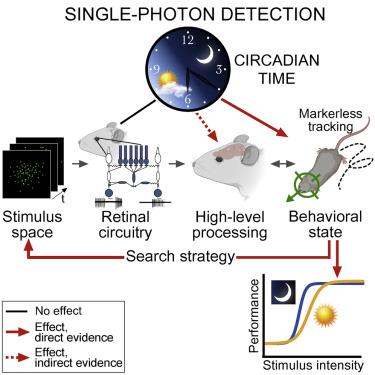当前位置:
X-MOL 学术
›
Curr. Biol.
›
论文详情
Our official English website, www.x-mol.net, welcomes your feedback! (Note: you will need to create a separate account there.)
Mice Reach Higher Visual Sensitivity at Night by Using a More Efficient Behavioral Strategy
Current Biology ( IF 9.2 ) Pub Date : 2019-12-19 , DOI: 10.1016/j.cub.2019.11.021 Sanna Koskela 1 , Tuomas Turunen 2 , Petri Ala-Laurila 2
Current Biology ( IF 9.2 ) Pub Date : 2019-12-19 , DOI: 10.1016/j.cub.2019.11.021 Sanna Koskela 1 , Tuomas Turunen 2 , Petri Ala-Laurila 2
Affiliation

|
Circadian clocks predictively adjust the physiology of organisms to the day/night cycle. The retina has its own clock, and many diurnal changes in its physiology have been reported. However, their implications for retinal functions and visually guided behavior are largely unresolved. Here, we study the impact of diurnal rhythm on the sensitivity limit of mouse vision. A simple photon detection task allowed us to link well-defined retinal output signals directly to visually guided behavior. We show that visually guided behavior at its sensitivity limit is strongly under diurnal control, reaching the highest sensitivity and stability at night. The diurnal differences in visual sensitivity did not arise in the retina, as assessed by spike recordings from the most sensitive retinal ganglion cell types: ON sustained, OFF sustained, and OFF transient alpha ganglion cells. Instead, we found that mice, as nocturnal animals, use a more efficient search strategy for visual cues at night. Intriguingly, they can switch to the more efficient night strategy even at their subjective day after first having performed the task at night. Our results exemplify that the shape of visual psychometric functions depends robustly on the diurnal state of the animal, its search strategy, and even its diurnal history of performing the task. The results highlight the impact of the day/night cycle on high-level sensory processing, demonstrating a direct diurnal impact on the behavioral strategy of the animal.
中文翻译:

小鼠通过使用更有效的行为策略在夜间达到更高的视觉敏感度
昼夜节律时钟可以预测性地调整生物体的生理机能以适应昼夜周期。视网膜有自己的时钟,并且已经报道了其生理学的许多昼夜变化。然而,它们对视网膜功能和视觉引导行为的影响很大程度上尚未解决。在这里,我们研究了昼夜节律对小鼠视觉敏感度极限的影响。一个简单的光子检测任务使我们能够将明确定义的视网膜输出信号直接与视觉引导的行为联系起来。我们表明,视觉引导行为在其灵敏度极限下受到昼夜控制,在夜间达到最高灵敏度和稳定性。通过最敏感的视网膜神经节细胞类型(ON持续、OFF持续和OFF瞬时α神经节细胞)的尖峰记录来评估,视网膜中没有出现视觉敏感性的昼夜差异。相反,我们发现小鼠作为夜行动物,在夜间使用更有效的搜索策略来寻找视觉线索。有趣的是,即使在他们第一次在晚上执行任务后的主观日,他们也可以切换到更有效的夜间策略。我们的结果证明,视觉心理测量功能的形状很大程度上取决于动物的昼夜状态、其搜索策略,甚至其执行任务的昼夜历史。结果强调了昼/夜周期对高级感官处理的影响,证明了对动物行为策略的直接昼夜影响。
更新日期:2019-12-19
中文翻译:

小鼠通过使用更有效的行为策略在夜间达到更高的视觉敏感度
昼夜节律时钟可以预测性地调整生物体的生理机能以适应昼夜周期。视网膜有自己的时钟,并且已经报道了其生理学的许多昼夜变化。然而,它们对视网膜功能和视觉引导行为的影响很大程度上尚未解决。在这里,我们研究了昼夜节律对小鼠视觉敏感度极限的影响。一个简单的光子检测任务使我们能够将明确定义的视网膜输出信号直接与视觉引导的行为联系起来。我们表明,视觉引导行为在其灵敏度极限下受到昼夜控制,在夜间达到最高灵敏度和稳定性。通过最敏感的视网膜神经节细胞类型(ON持续、OFF持续和OFF瞬时α神经节细胞)的尖峰记录来评估,视网膜中没有出现视觉敏感性的昼夜差异。相反,我们发现小鼠作为夜行动物,在夜间使用更有效的搜索策略来寻找视觉线索。有趣的是,即使在他们第一次在晚上执行任务后的主观日,他们也可以切换到更有效的夜间策略。我们的结果证明,视觉心理测量功能的形状很大程度上取决于动物的昼夜状态、其搜索策略,甚至其执行任务的昼夜历史。结果强调了昼/夜周期对高级感官处理的影响,证明了对动物行为策略的直接昼夜影响。



























 京公网安备 11010802027423号
京公网安备 11010802027423号